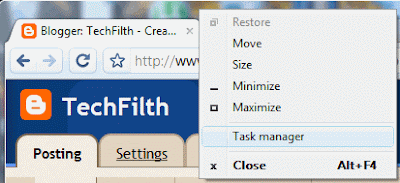Application being named and shamed: Google Chrome
I downloaded Chrome today to have a play with it, and before i start i must mention that it is a beta, but i think the shortcomings i am going to critique are important. I installed this onto a machine running Vista Ultimate, so your experience may differ. I am typing this blog post in Chrome, not that it really matters to what i am going to say :)
First problem: It's called "Chrome". This is also the term used to describe the title bar and menu bar area etc of the application window. This screenshot is the chrome area of IE:

It might be a cool sounding name and easy to market, but wtf using a piece of terminolgy that is in common use amongst Microsoft folks? Is this a sly shot at the company you are in close competition with?
Second: When you download Chrome, you are downloading a stub installer that when run goes back to the net without asking or notifying me and retrieves the rest of the install package. This may make life easier when you roll out the beta, because if any issues occur you can just fix the main install and you don't have to replace the stub which people have already downloaded. But it is bad because the installer has not told me what version of the product i am installing, and the version that i install on another machine tomorrow can be different from the version i installed today. The installer needs to be fully open and informative about what it is doing and exactly what it is installing. Where did the install package come from? Why do i not get a chance to virus scan it before installation?
Third: Chrome automatically installed itself into a user specific area on my machine. At no stage did i get asked for an install location. This is incredibly bad - this is my machine, and i dictate where things go on it (as it happens, i don't install *any* applications to my C: drive, they all go onto a drive reserved specifically for applications).
Fourth: This is also bad because Chrome's data gets stored in the same location, and Chrome provides no way of changing that. This means that anything that is downloaded gets cached in this location. For me this is unacceptable - all the browsers i use (IE, Firefox and Opera) are set to store their cache items on a totally different drive. This means i can quickly and easily check, search or delete the cached content without starting the applications or navigating deeply into a folder structure. It means i can easily set ACLs (permissions) on folders and files, all in the one place. It also means that temporary files are not needlessly filling up my boot drive!!!!
Fifth: WTF is with all the processes being started by Chrome? This was with two tabs opened:

Sixth: if i right-click in the chrome area of Chrome (that was funny!!!!!!!), i get a context menu, and one of the options is "Task Manager":

too late Google - that name is already taken, it is the little system utility that i start up to check on system resources or to kill errant processes. But you know that already, so why choose that name for your dialog? Call it something else, maybe "Application Tasks", or "Tab Manager".
I have nothing against Google, and to be honest there are some things i also like about Chrome (but i'll blog about those once i've had more time to play). But to make simple and fundamental mistakes like they have is unacceptable, and if i was an IT administrator there would be no way i would allow this browser on my corporate network. Just because you are Google you don't have exemption from the rules or conventions.
When an application installs on my machine, it must:
1: if it fetches extra components then it must tell me what they are and where they are coming from - it is my machine and i have the right to know.
2: it must give me an option of where to install it to. If they want to restrict my choices that is fine, but i should have the right to cancel the install if i don't like the options available to me.
3: it must offer me some way to configure its options, like where the cached items are to be stored, and the tab behaviour i want, and whether i want to allow script to execute in pages, etc. A lack of configurability is fine in alpha software, but not beta. Labelling your software as "beta" means you are on the home stretch towards "going gold", not just starting the race**, so there is no excuse for not having an options/settings UI.
* i know that installing an application into %APPDATA% could solve a couple of issues, namely the application should have no issue directly accessing its data files/folders because Vista's file virtualisation shouldn't be triggered, but that's not the point - this area is for data, not the application. Or maybe Vista restricted the install to installing there as it was downloading (installing) from an untrusted location. At the very least the application should be installed into %PROGRAMFILES%. Better still it should give me an option, defaulting to %PROGRAMFILES%.
** i have to mention that this is something that Google seems to have redefined with their other applications, like Gmail. It is labelled as "beta" as soon as it is opened to the public, and is still called "beta" several (4? 5?) years later. Will this happen with Chrome as well?
Keywords: google, chrome, sub optimal, bad install


